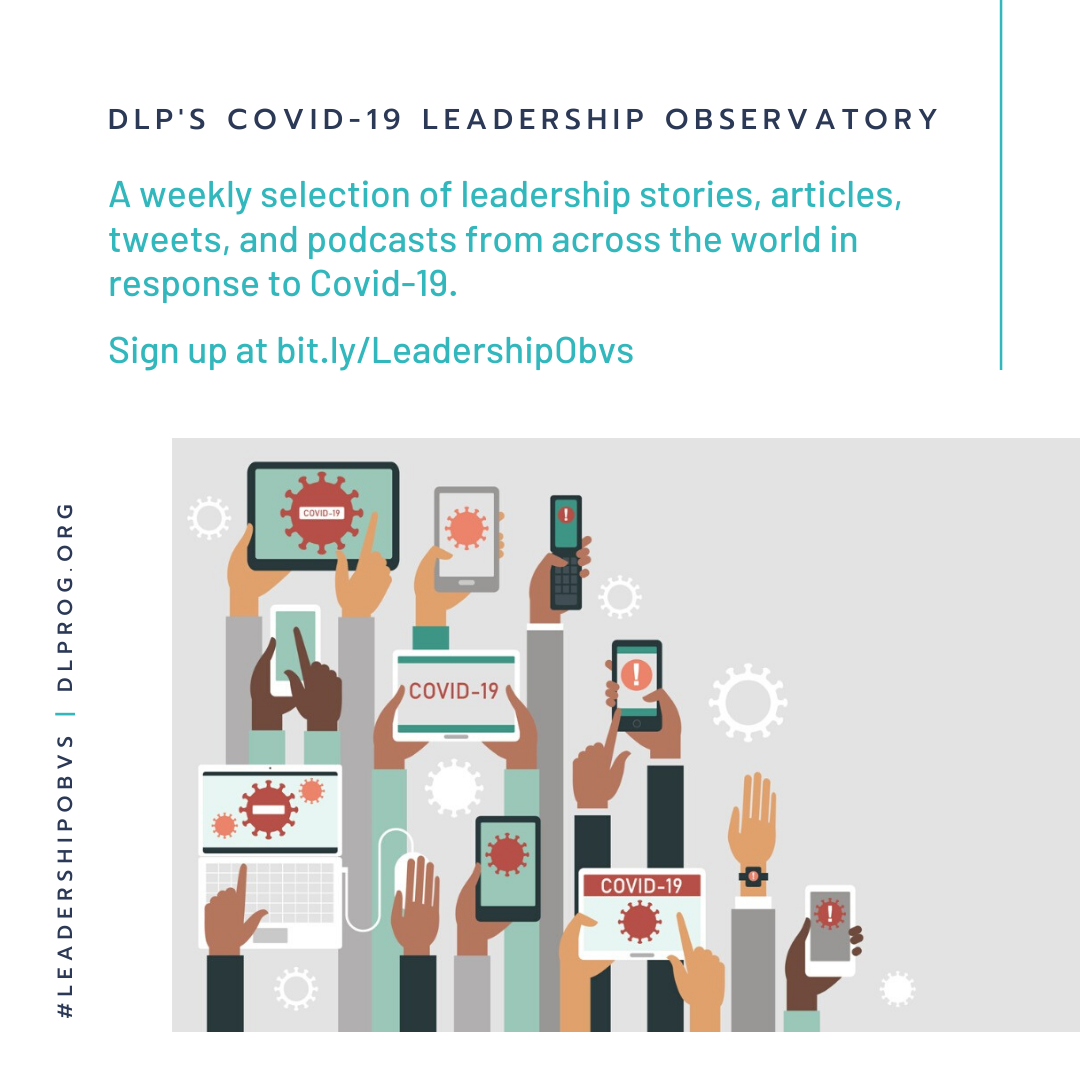During the COVID-19 pandemic, DLP remains committed to supporting leadership, wherever it may be, by helping the flow of knowledge and experience between practitioners, policymakers and researchers. DLP’s weekly #LeadershipObvs collects and summarises all of the leadership focussed resources that we have found most useful for understanding developmental leadership during the crisis – whether they be reports, articles, tweets, videos, podcasts, blogs or other. Covering everything from the challenges of leadership, how to navigate the current conjuncture, how to support processes of leadership, or looking to the future of leadership. Each Observatory is a five-minute read summarising and linking to some of the most helpful work on leadership that week.
Arkebe Oqubay, ‘COVID-19 – An Unprecedented Global Threat that Deserves Unprecedented Leadership’, OECD, 24 April 2020.
Arkebe Oqubay calls on world leaders to learn lessons from the ineffective global response to COVID-19, work together to provide exceptional leadership, find opportunities for scientific collaboration, and build a global coalition to end the unprecedented threat. The US and other G7 countries, G20 and emerging powers, need to forge a united front and spearhead an international alliance with developing nations. Oqubay outlines the imminent threats faced by developing countries and praises the efforts of large multilateral donors such as the IMF and the World Bank Group for voicing their concerns and calling for international emergency support. Nations need to stand together globally to ensure developing countries will be supported adequately during the pandemic.
#LeadershipObvs in a nutshell: World leaders are encouraged to form an international alliance to help developing countries fight COVID-19.
Penny Lawrence, ‘Leading in the COVID-19 Crisis: Tips for NGO Leaders’, Bond, 14 April 2020.
Penny Lawrence, an executive coach for NGO leaders, provides advice to support effective decision making and increased collaborative and collective leadership. Lawrence offers a list of questions leaders, senior managers and boards can consider during moments of reflection, which aim to regulate organisational responses to COVID-19. Pausing and reflecting matters now more than ever as NGO leaders consider the skills and experiences available to them through collaboration with stakeholders internally and externally. The blog concludes with a helpful sample crisis planning document. The piece also emphasises the importance of pausing to reflect and to co-create strategy with colleagues to remain inclusive and transparent.
#LeadershipObvs in a nutshell: Effective NGO responses to COVID-19 will depend on collaborative rather than individual leadership.
Ethan McCoy, ‘Leadership in a Time of Crisis’, The Centre for Effective Philanthropy, 14 April 2020.
By learning from great leaders of the past, and taking a historical approach to leading in a time of crisis, McCoy draws out key points from a recent webinar, aimed at philanthropic and non-profit leaders. The webinar highlights 15 things sector leaders can keep in mind as they adjust to the COVID-19 pandemic. The webinar uses examples of well-known successful leaders in history to reassure present-day leaders that there are many approaches to leading in crisis – with no single ‘best’ way, reminding leaders “you’ve never been needed more than you are now, and you will never be needed more than you are now.”
#LeadershipObvs in a nutshell: The history of leadership tells us there is no single best way to lead during a crisis.
Sheikh Tanjeb Islam and Yash Nitin Divadkar, ‘How Bangladesh’s leaders should respond to the economic threats of COVID-19’, World Economic Forum, 13 April 2020.
This blog, aimed at government officials, details the steps taken by the Bangladesh Government in response to the economic impact of COVID-19. Global challenges such as coronavirus can’t be managed by one country and require coordination between the public and private sector at the local and international level. Tanjeb and Divadkar make a strong case for Bangladesh’s leaders to tap into the support of the World Economic Forum to galvanise support for its private sector and share some of its own experience in fighting COVID-19. Government leaders should rethink and adapt stimulus packages to meet the needs of the economy and to protect a large proportion of workers in the informal sector.
#LeadershipObvs in a nutshell: Responding to the crisis effectively may rely on public-private cooperation.
Rachel A. George, ‘What Other Sectors Can Show for Women’s Leadership in COVID-19’, Think Global Health, 13 April 2020.
Women make up the majority of the health workforce against COVID-19, but less than a quarter of leadership roles in global health. This thinking piece shares lessons on women’s inclusion from the fields of conflict resolution, peace and security, and business, to help ensure we move from recognition to tangible action. Success in other sectors reinforces the need for sustained and amplified investment in women’s groups and networks. The inclusion of women’s groups and leaders early on is going to be critical to how society responds as a whole.
#LeadershipObvs in a nutshell: Women leaders are central to crisis response, and their early inclusion is critical for successful outcomes.
Sign up to receive the #LeadershipObvs directly to your inbox
A full list of leadership resources
Other resources are available on Twitter using #LeadershipObvs @DLProg











